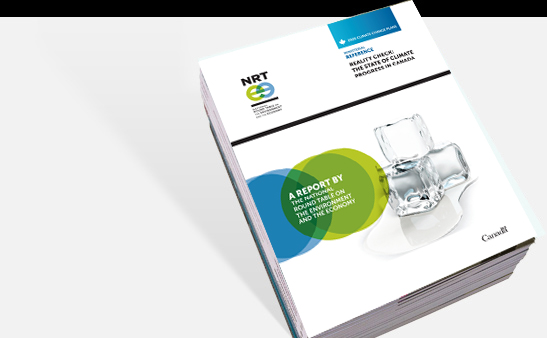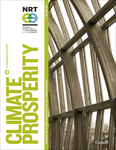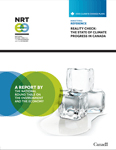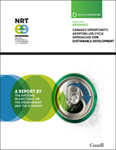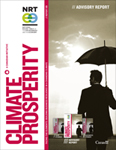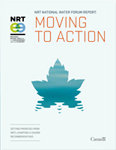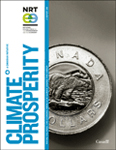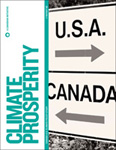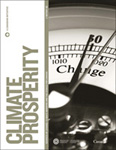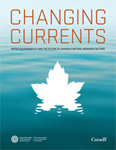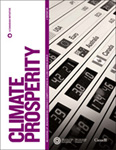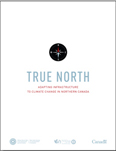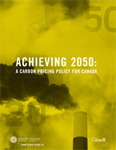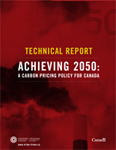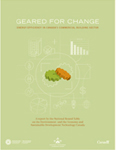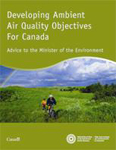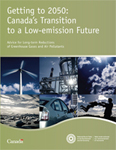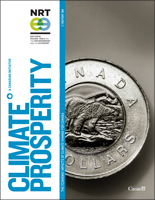Paying the Price: The Economic Impacts of Climate Change for Canada – Advise
Global emissions will have a price tag for Canada. Investing in adaptation and mitigation can help keep costs down. Climate inaction means a greater price to pay.

Climate Change Could be Expensive for Canada
 Unless global greenhouse gas (GHG) emissions are brought down and Canada invests in adaptation, the economic impacts of climate change on Canada could climb to
Unless global greenhouse gas (GHG) emissions are brought down and Canada invests in adaptation, the economic impacts of climate change on Canada could climb to
billions of dollars per year.
Paying the Price: the Economic Impacts of Climate Change for Canada – the fourth report in the NRT’s Climate Prosperity series – is the first national study to show what the economic consequences to Canada could be as a result of climate change, under four separate scenarios involving two factors: global GHG emissions and Canadian economic and population growth.
Although Canada contributes approximately 1.5% of global emissions, the report concludes that climate change impacts brought about by increased world-wide emissions have a real and growing economic cost to Canada. It also shows that adaptation – our capacity to manage the impacts to come – while not cost-free, is a cost-effective way to alleviate some of those impacts.
Based on NRT original economic modelling, the report finds that the economic impact on Canada could reach:
- 2020: $5 billion per year
- 2050: Between $21 and $43 billion per year
In the 2050s:
- Timber supply impacts could range from $2 billion to $17 billion per year with high impacts in B.C.
-
Flooding damages to coastal dwellings, resulting from climate change-induced sea-level rise and storm surges, could cost between $1 billion to $8 billion per year with higher than average cost impacts in Atlantic Canada
-
Poorer air quality resulting from higher temperatures will lead to more hospital visits, resulting in millions of dollars in costs to local health care systems for four of Canada’s major cities – Toronto, Montréal, Vancouver and Calgary
Read the executive summary or download the full report
WHAT DID WE FIND?
- Climate change is expensive
- There is a risk that the costs could be far higher than we expect
- Adaptation can save us money
- Global mitigation reduces Canadian economic impacts and makes adaptation cheaper
- The costs of climate change impacts and adaptation are uneven across the country
WHAT DOES IT MEAN?
- Ignoring climate change costs now will cost us more later
- Adaptation isn ’t cost -free but often yields benefits
- Adaptation policy and decision making can benefit from economic assessments
WHAT DO WE RECOMMEND?
Canadians can and should use economic information to decide how to best prepare for, and respond to, the impacts of climate change. Our recommendations are as follows:
- The Government of Canada invest in growing our country’s expertise in the economics of climate change impacts and adaptation so we have our own Canadian-focused, relevant data and analysis for public and private-sector decision makers.
- The Government of Canada cost out and model climate impacts to inform internal decisions about adapting policies and operations to climate change and allocating scarce resources to programs that help Canadians adapt.
- Governments at all levels continue investing in generating and disseminating research to inform adaptation decision making at the sectoral, regional, and community level. This research should, as a matter of routine, incorporate economic analysis of the costs and benefits of options to adapt to climate impacts because the current data is insufficient for decision makers and is not readily or consistently available.
- The Government of Canada forge a new data- and analysis-sharing partnership with universities, the private sector, governments, and other expert bodies to leverage unique and available nongovernmental resources for climate change adaptation.
WHERE DO WE GO FROM HERE?
Paying the Price highlights areas where additional research and analysis on climate change impacts and adaptation are needed for Canada. Having clearly identified economic risks associated with a changing climate, we need to turn our attention to exploring the economic opportunities of adaptation — to both cope and prosper through inevitable degrees of climate change.
[Read more…]

Timber supply
__________________

Coastal areas
__________________

Human health
__________________
![]()
News Release – Sept. 29, 2011
NRT RELEASES CANADA’S
FIRST ANALYSIS OF THE
COSTS OF CLIMATE CHANGE
Climate Change Could
be Expensive for Canada
Prairies and Canada’s North news release
Expert Advisory Committee
Manager
Climate Change Impacts & Adaptation Division
Natural Resources Canada
Senior Policy Analyst
Climate Change and Health Office
Health Canada
Senior Policy Analyst
Climate Change Central
Director of Atmospheric Issues and Senior Scientist
Pollution Probe
Ottawa practice leader
Corporate Responsibility & Sustainability
Deloitte
Researcher
Adaptation and Impacts Research Division
Environment Canada
Adjunct Professor
York University
Association Secretary
Director, Energy, Economics and Climate Change
Forest Products Association of Canada
Director
Climate Change Secretariat
New Brunswick Department of Environment
Manager
Strategic Policy Branch
Ontario Ministry of Environment
Director
Strategic Policy Directorate
Environment Canada
Director
Insurance Bureau of Canada
Policy Advisor
Federation of Canadian Municipalities




